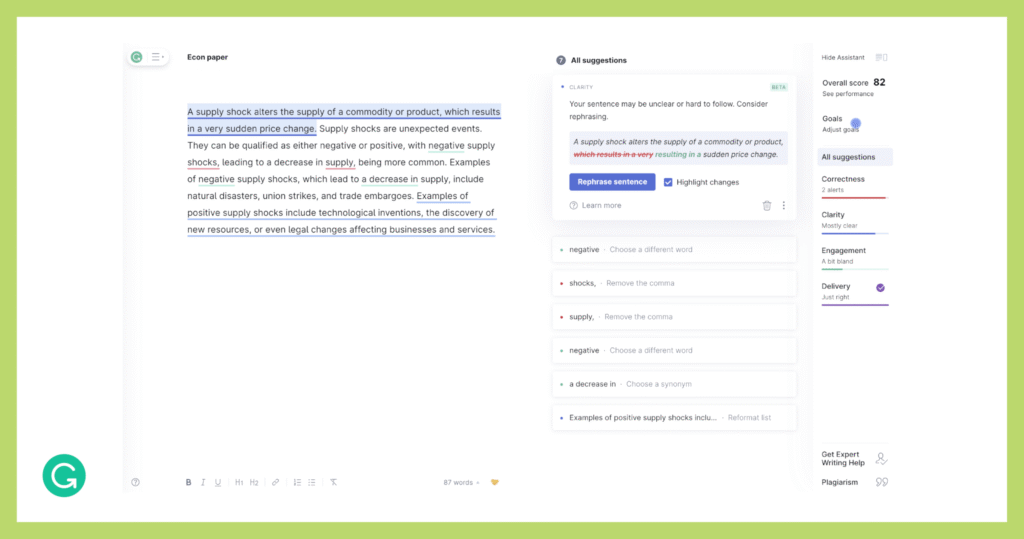Writing high-quality blog content is no longer just about creativity — it’s also about clarity, correctness, and reader engagement. For beginner bloggers, using the right editing tool can make a massive difference in producing polished posts. Two of the most popular writing tools — Grammarly and Hemingway — often top the list.
But which one is better for bloggers? In this in-depth comparison, we’ll explore Grammarly vs Hemingway in terms of features, pricing, accuracy, ease of use, and their impact on your blogging workflow.
Why Editing Tools Matter for Beginner Bloggers
As a new blogger, grammar mistakes, awkward phrasing, and unclear structure can reduce your credibility. Editing tools like Grammarly and Hemingway act like a second pair of eyes. They help:
- Improve grammar and spelling
- Enhance readability
- Ensure consistent tone
- Make your content more professional

Let’s dive into what each tool offers.
Grammarly Overview
Grammarly is an AI-powered writing assistant known for its advanced grammar, punctuation, and style correction. It’s available as:
- A web-based editor
- Browser extension
- Desktop app
- Microsoft Word/Google Docs plugin
Key Features
- Real-time grammar and punctuation checks
- Suggestions for clarity, tone, and engagement
- Plagiarism detection
- Weekly performance stats
- Personal writing goals
Grammarly Pros for Bloggers
- Extremely accurate grammar correction
- Tone detection (great for brand voice)
- Works across most blogging platforms
- Plagiarism checker helps with originality
Grammarly Cons
- Advanced features locked behind paid plan
- May over-correct creative writing
- Requires internet connection
Hemingway Overview
Hemingway Editor is a tool focused on readability and concise writing. It highlights hard-to-read sentences, passive voice, and adverb overuse.

It’s available as:
- Free web version
- Paid desktop app (one-time fee)
Key Features
- Highlights long or complex sentences
- Identifies passive voice
- Grade-level readability score
- Simple, distraction-free interface
- Export to Word or HTML
Hemingway Pros for Bloggers
- Great for simplifying writing
- Helps improve readability scores (important for SEO)
- One-time payment (desktop version)
- Perfect for minimalists and clean writing
Hemingway Cons
- No grammar/spelling correction
- No plagiarism checker
- Doesn’t suggest rephrasing
Grammarly vs Hemingway: Side-by-Side Comparison
| Feature | Grammarly | Hemingway |
|---|---|---|
| Grammar Check | ✅ Advanced | ❌ None |
| Readability Score | ✅ Yes | ✅ Yes |
| Rephrasing Suggestions | ✅ Yes | ❌ No |
| Plagiarism Checker | ✅ Yes (Premium) | ❌ No |
| Tone Detector | ✅ Yes | ❌ No |
| Offline Mode | ❌ No | ✅ Yes (Desktop) |
| Cost | Freemium (Premium starts at $12/month) | $19.99 (One-time) |
| Learning Support | ✅ Weekly insights | ❌ None |

Which Is Better for Different Types of Bloggers?
Grammarly Is Ideal For:
- Bloggers who want a polished, professional tone
- Non-native English speakers
- SEO writers (Plagiarism and tone tools)
- Long-form content creators
Hemingway Is Ideal For:
- Bloggers who want to write short, impactful posts
- Writers focused on storytelling or lifestyle content
- Minimalist writers
- Editing without distraction
Real-World Examples: Grammarly vs Hemingway in Action
Let’s say you write a sample blog post paragraph:
“It is absolutely crucial that you should try to avoid using an excessive number of redundant words when you are attempting to convey your primary idea to the audience.”
Grammarly Suggestion:
“Avoid using too many redundant words when conveying your main idea to the audience.”
(Corrects grammar, improves tone, and reduces verbosity)
Hemingway Suggestion:
Highlights the entire sentence in red (very hard to read)
(Suggests simplifying sentence structure but does not rewrite it)


Pricing Breakdown
Grammarly
- Free Plan: Basic grammar and spelling
- Premium: $12/month (billed annually)
- Business Plan: $15/member/month
Hemingway
- Web Version: Free
- Desktop App: $19.99 one-time payment
(Works offline, export features included)


Which Tool Do Bloggers Prefer?
Bloggers who write SEO-focused or technical posts tend to favor Grammarly, because it ensures clean grammar, tone, and plagiarism-free content.
Bloggers in lifestyle, travel, or storytelling niches often lean toward Hemingway because it encourages simple, reader-friendly language.
But the truth is — many successful bloggers use both tools together. Use Grammarly for final grammar/punctuation checks and Hemingway to simplify and clarify your message.
Our Verdict: Grammarly vs Hemingway for Bloggers
Both Grammarly and Hemingway have their strengths. If you’re just starting out and want to sound professional, Grammarly is hard to beat. But if your main goal is to write in a clear, reader-friendly voice, Hemingway is a great asset.
Use Grammarly if you need:
- Strong grammar correction
- Plagiarism detection
- Polished, professional content
Use Hemingway if you want:
- Simpler, more readable writing
- One-time affordable pricing
- A lightweight writing assistant
Tips for Using Grammarly and Hemingway Effectively
- Draft your post in WordPress or Google Docs
- Run it through Hemingway to simplify complex sentences
- Run it through Grammarly to catch grammar and spelling issues
- Check readability score and tone
- Finalize with a proofread before publishing
FAQ – Grammarly vs Hemingway for Bloggers
Grammarly has a browser extension that works well in WordPress. Hemingway doesn’t directly integrate but allows HTML export.
Grammarly is more helpful for ESL bloggers due to its detailed grammar explanations.
Final Thoughts
If you’re a beginner blogger looking to publish better content, Grammarly and Hemingway can both help — but in different ways. Grammarly is your go-to grammar coach, while Hemingway is your clarity mentor. Depending on your writing goals, one may suit you better — or you may find that using them together gives you the best of both worlds.
No matter which you choose, using a writing assistant will improve your content quality and save time. And that means more confidence and better results for your blog.






